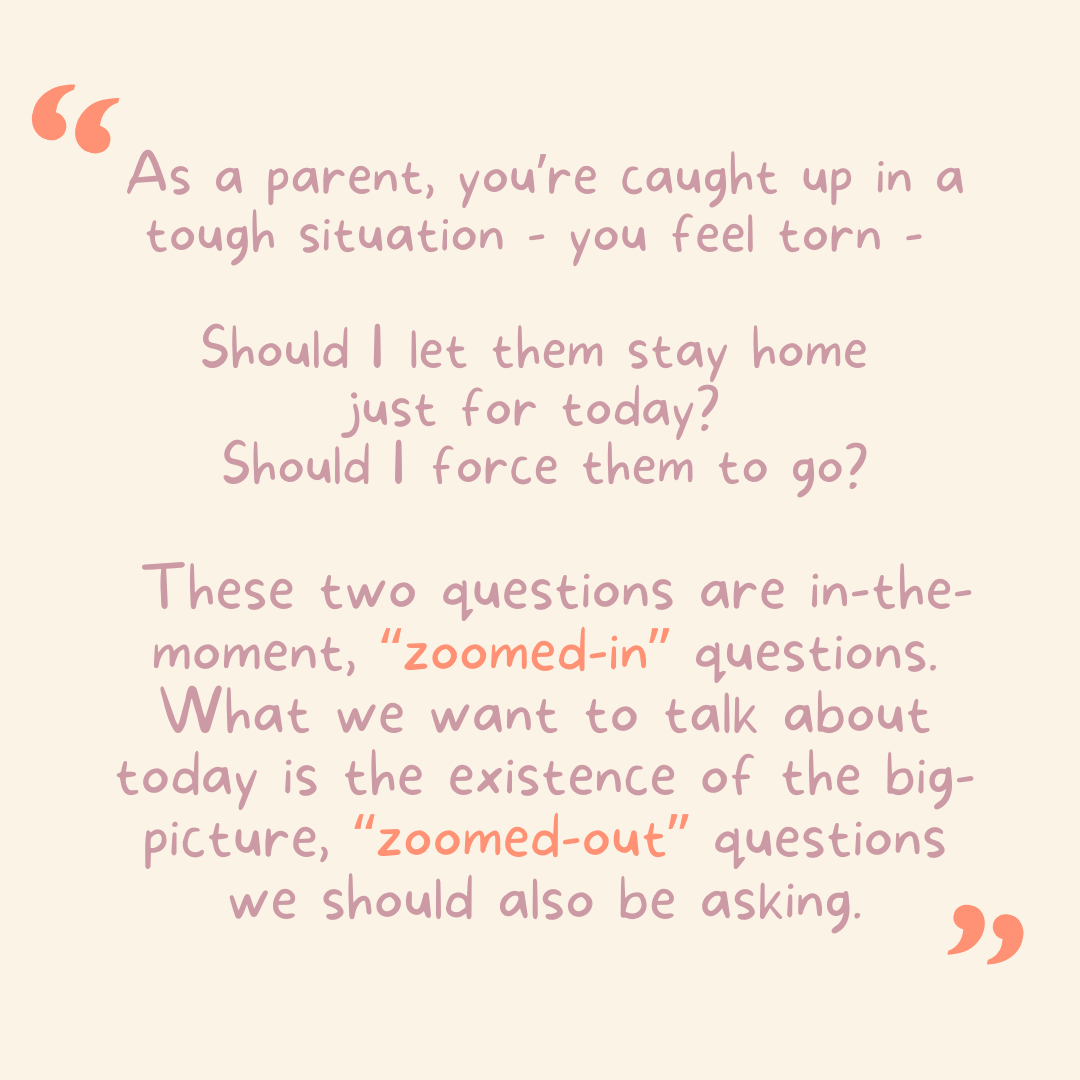Should I let my child stay home when they say they need a day-off from school?
It’s a Monday morning, it’s cold and the sky is cloudy. You gently walk into your child’s room to wake them up for school, and you’re greeted with begs and cries of “I reeaally don’t want to go!” They mention how their tummy hurts, how they didn’t sleep well, how they might even have a fever. When you ask a bit more, they mention that they don’t like going to school and would really rather just get one day as a break. They promise that they will study extra hard this weekend if you let them take today off and stay home from school.
As a parent, you’re caught up in a tough situation - you feel torn - should I let them stay home just for today? Should I force them to go? These two questions are in-the-moment, “zoomed-in” questions. What we want to talk about today is the existence of the big-picture, “zoomed-out” questions we should also be asking.
The main zoomed-out question we notice in our scenario is, “Why does your child not want to go to school?”. Of course, they tell us that they don’t like it, but this doesn’t give us much information either. Part of the reason why parents feel so torn in these moments is because in some circumstances, the right choice would be to stay home, whereas in others the right choice might be to encourage them to get to class. By asking a zoomed-out question, we can become better informed to answer our zoomed-in ones.
Before we get into what reasons your child may answer with if we were to ask why exactly they do not want to go, it is important we first discuss avoidance behaviors.
We can all relate to the need to avoid - it is a gut instinct we get when we find ourselves in situations that make us uncomfortable. Those instincts kick in to encourage you to move away from the discomfort (or sometimes even from real danger!). For example, if food smells funky, we have learned that we should avoid eating it or we could get sick. If a tiger is prowling around us, we have learned we should walk away to avoid becoming its lunch!
Although it’s something we often forget, everyone occasionally avoids certain situations. And, even more importantly, we often do want to listen to those instincts saying ‘avoid!’ because they are a part of the internal systems that keep us safe.
What makes all of these things tricky is our alarm system isn’t always right. Just like when your motion detector rings an alarm when there is nothing there, our avoidance alarms can also go off when there isn’t any real danger. The lesson here is that we should listen to our alarm bells, but verify whether they are true or false before acting. If we can understand what is causing the alarm bells to go off and the avoidance behavior to set in, we can then as parents and caregivers guide our children effectively as we either listen to the alarm bells (because there was real danger!) or encourage them forward (because the alarm bells’ wiring needs a little bit of tweaking).
Helping a child with avoidance means becoming aware of the ways avoidance behaviors sneak in. Here are somethings you might notice about your child that could mean that there is a deeper rooted anxiety present:
Feeling sick (especially nauseous, or stomach pains): anxiety is deeply routed to our guts, meaning that a lot of the symptoms of anxiety are gastrointestinal. If your child says they are feeling sick, they are not lying even if the root cause is anxiety rather than a bug. These feelings of illness, however, also do provide a route to avoidance, because if they are ill, they can’t attend or participate in the thing causing fear.
Only engaging under certain circumstances: if your child won’t go to football practice one day, but happily goes another day when their best friend is present, this is also a sign of avoidance and anxiety at play. Oftentimes, kids find things that allow them to feel safe enough that the alarm bells stop sounding. This could mean carrying a special object with them, wanting things arranged in a certain way, or leaning on someone else for social support during the feared situation.
Picky preferences: We are all allowed to have preferences, this is of course natural! However, if your child says they do not like a certain food, it’s important to reflect on is it actually that they do not prefer it or are they trying to avoid it because they are afraid of a number of possible reasons (such as fears of it making them sick, fears of choking, etc.). We can oftentimes mistake avoidance as a preference, allowing the avoidance to grow
Why is it important to be on the look out for avoidance behaviors?
Well, in our school example, it’s a bit clearer - the kids have to go to school! However, the other important piece here is that, as we have hinted to throughout this article, avoidance behaviors are rooted in fears. When kids engage in avoidance, they actually strengthen those fears, too. That’s why it’s so important that we try to check-in on those gut reactions to avoid, and if there is no danger, try our best to face our fears!
Of course, facing fears is way easier said than done. We specialize in supporting kids and teens to overcome their fears, using a variety of approaches - like acceptance and commitment therapy, where we try find balance and acceptance in the fact that there are certain scary truths in the world, but we can continue to live fulfilling lives regardless; as well as cognitive behavioral therapy and exposure therapy, which target through practice reducing the anxiety around the fear. Working alongside a professional to guide you through this process can be extremely beneficial to the long-term mental health outcomes - and we would love to be a part of your child’s journey to independence from their fears!
For more information about our services and getting started with The Expat Kids Club, click here!


